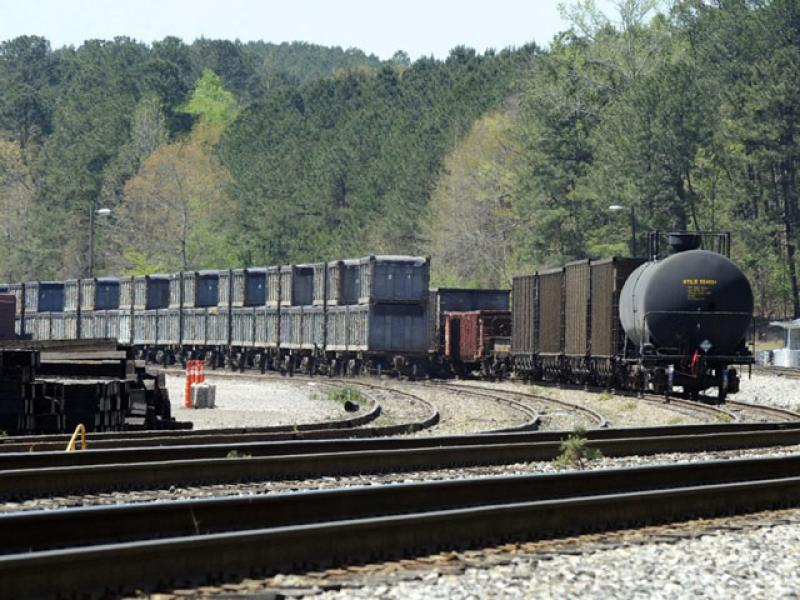Love Thy Neighbor: The Bible Belt is Becoming a Dumping Ground - OZY



In northwest Georgia, Donnie Smith spends slow mornings at his auto shop, watching Netflix and counting the trucks passing by his window. You can hear the 18-wheelers from a mile away, barreling down the picturesque Appalachian countryside as early as 4 am. Hundreds of them carry toxic coal ash and a sterile stench daily to the landfill next door, which leaves residents nervous about drinking the tap water from their otherwise pristine lake. “There is another one,” Smith points out every minute or so. “Once they got the foot in the door, you couldn’t get them out.”
You’ll find the same book, just a different verse, in downstate South Carolina, where Uncle Sam and private industry have left the Savannah River with radioactive cesium levels that are among the world’s highest, according to the National Council on Radiation Protection and Measurements. Already saddled with at least $35 million in cleanup costs from now-bankrupt companies, the region’s burden comes with radioactive alligators and disturbingly high cancer rates that shot up by as much as 25 percent in some counties between the 1980s and the 2000s. “I’m not going to sit here and tell you I’m not worried,” says Audrey Lofton, a former Savannah River Site janitor. “What can a little nobody like me do but talk about it?”
Stories like these are piling up as surely as the growing landfills in their backyards. Individual trash dumps in the South have drawn national attention in the past. But an in-depth investigation by OZY reveals a previously unreported, persistent trend of Northern waste being systematically shoveled onto Southern shoulders. Seven of the 10 states that export the biggest chunk of their municipal solid waste — commonplace trash — are from the North, according to thousands of pages of trash data and public records from all 50 states, analyzed by OZY.
Meanwhile, we found that five of the 10 states that receive the most waste as a share of their total trash burden are in the South: Virginia, third in the nation, followed by South Carolina in sixth, Mississippi in eighth, Kentucky in ninth and Georgia in 10th place, according to their latest data. Sure, Oregon and Pennsylvania lead the country, with 41.3 percent and 39 percent of their managed municipal solid waste coming from other states, respectively. However, those states are solitary islands of rubbish in the Pacific Northwest and the Northeast. The South carries an outsize burden: No other region has more than one state in the top 10 receiving waste.
**********
So what’s the solution?
Technology holds some answers. Last year, Washington State University researchers created a process for turning coal ash into concrete that, if scaled properly, could solve Georgia’s problem. In January, Berkeley, California-based Deep Isolation successfully dropped and retrieved a prototype canister (which, in practice, would hold radioactive waste) more than 2,000 feet into the Earth’s surface.
Policymakers could also create a more equal distribution nationwide, with an emphasis on land that poses fewer environmental or health risks. Politicians have proposed Yucca Mountain, in Nevada, as an option for nuclear materials for decades, since waste could be stored far below the surface and the closest population center, Las Vegas, is 100 miles away. However, the state of Nevada and others argue seismic activity in the area could be dangerous. Coal ash could be sent West, suggests Bonitatibus, where desert environments and sparse populations would be less susceptible to the dangers of toxic waste — but companies aren’t eager to foot the bill for shipping coal ash across the country.
Finally, regulatory agencies could standardize how waste data is gathered, experts say. Fewer than half of America’s states consistently collate their waste-export data volumes. Three states (Alaska, Idaho and Wyoming) don’t require any tracking of waste. Some states lump other forms of waste — such as hazardous or mechanical waste — with municipal solid waste, muddying the information. Kent Foerster, an environmental protection specialist at the EPA, is leading an effort to start collecting “like” data from all states, but it has yet to be implemented. Better information could lead to better solutions.
It’s unclear which — if any — of these efforts might yield a fix. Until then, the disproportionate burden of waste on America’s South will continue to deepen a historic divide in an already fractured country, for folks like David Brasfield, a 71-year-old retiree in West Jefferson, Alabama. “They’ve got land up there,” he says bluntly. “They can handle their stuff. And we’ll handle ours.”
Seeder’s note: Only excerpts from the article published by OZY have been posted. Click on the link to read the full article; it’s not trapped behind a paywall.







I was going to post this.
It is a long read but very eye opening. A lot of toxic sludge being shipped around. Always seems to be poorer areas that end up with it.
What made me do a double take was the line about some farms in Alabama using human waste as fertilizer.
That can be deadly can't it? Using human waste as fertilizer?
I knew a number of farmers in MN that used it on hay fields in the 80's. It came with warnings, but to my knowledge no one got sick or died. It was very strong and burned some of the fields on first use.
If it's processed correctly, it does a great job.
Processing human waste for distributing on open farm fields, sod farms, tree farms, etc.... is huge business in my state. Lot's of regulations to follow to be able to do that, but the money is worth it for the owners of the plants, and the farm owners too. We permitted processing plants like that for quite some time, and for some VERY good money in our pockets too.
I read a story, it was from China I believe and the person didn't wash the strawberries off first and he died from E. Coli
There is a lot of it around. We all know people that are full of it. Haha
I guess if it is processed. Still unsure myself. We have people getting sick from fecal matter in swimming pools.
It sounds like though they are using it for grass and trees. Not really things for human consumption.
For Sure !
"I guess if it is processed."
Visit a "Sewage Treatment Plant", or a "Solids processing plant" just once. It's a dirty business, but someone MUST do it.
It's an expensive, but lucrative business. You must get permits, and it takes a lot of testing and money to get one. It's a requirement that permit holders must start the renewal process one year before the permits expiration date, as it takes that long to come up with all proof required to prove you have met all the standards required, in order to get that renewal.
People don't seem to look past "Flushing the toilet", because it just happens as a norm for them, everyday. Where that flush ends up, not many know, but the complications for the people running the places where it ends up, It's a Huge expensive and exhaustive testing Deal.
The environmental movement has always tacitly accepted NIMBY practices. That's a large factor in the trade deficits the United States is experiencing.
The danger associated with human waste are human pathogens. If the waste is properly digested (wet composted) then the risk is very low. However, if there is a strong odor then the waste has not been properly treated.
Yep. A lot of trash being shipped from the east coast. That is not even factoring in all the coal ash and radioactive waste. What is sad was the promise of jobs and tax money for the communities involved that never materialized. A few pockets being lined then these communities get screwed over. Still poor, few jobs, hardly any tax money and stuck with it all.
As far as the human waste I am on the fence. Had to shake my head at the train full of human waste that got stuck on the tracks. The poor people in that area that had to deal with the putrid smell. Just doesn't seem healthy.
Environmentalists have completely rejected the idea that these waste streams are resources. Reclaiming materials from waste streams would naturally reduce the amount of waste and, usually, would reduce the toxicity of the waste. The hard work of concentrating useful minerals and materials has already been done, so reclamation would be more a matter of separation than concentrating and refining the materials.
RCRA screwed the pooch by creating obstacles for reclamation and by allowing co-mingling of wastes. EPA has done more to harm the environment than people are willing to recognize.
Environmentalists tend to oppose reclamation efforts by pointing out that such reclamation would not pay for itself. That is usually true. But landfill internment doesn't provide any offsetting revenue. The traditional environmentalist's approach is all cost and no recovery.
If the waste had been properly composted there would not have been a strong odor. Garden centers are full of bagged animal (and human) waste but the waste has been properly composted. Potted plants using contain a large amount of animal manure in the potting soil; people are bringing animal manure into there homes with potted plants.
The strong odor from the trains suggests that raw, untreated sewage was being shipped. Some big city POTW was taking a shortcut to save money.
It seems reclamation would be the way to go but if there is no money to be made...
A lot of people are turning a blind eye to a serious problem.
The part about Kentucky stuck out, where out of state trucks illegally dumped toxic fracking waste across the street from a school. It was never cleaned up and nothing done about it (except a fine) and decided by the local politicians that no charges would be brought against the companies involved.
It seems some environmental groups have a narrow scope, some politicians turn a blind eye yet the average Joe gets screwed over by living next to toxic lands.
Business as usual I guess.
IMO some things are going to have to change. We live in a throw away society. Just burying everything is not working, can't burn everything, sadly I don't really see much of a solution. A change would have to be made in consumption and the making of biodegradable goods.
The landfill near me has taken some steps as they now separate what can and cannot be dumped. Like now they separate electronics, appliances etc.
There isn't any money to be made from disposal; for a waste generator it is all cost. But reclamation can lower the cost of disposal and, in some cases, lower the cost of manufacturing by reusing materials that would otherwise be lost.
The agency I was associated with built a large scale demonstration MRF in the late 1970s to show that reclamation wasn't difficult using existing technology. Today material recovery facilities are common practice.
The problem is that recovery and reclamation won't generate enough revenue to pay for itself. And waste disposal is being neglected just like the rest of our infrastructure. Ignoring infrastructure is always cheaper until something breaks.
Yeah no one wants trash in their areas so it does get shipped around (been going on as long as I can remember) and it does often land in poor areas (domestically and overseas) because they either lack the resources to fight it or want the promised money (which the average Joe never see's). It would be nice if there was a better solution